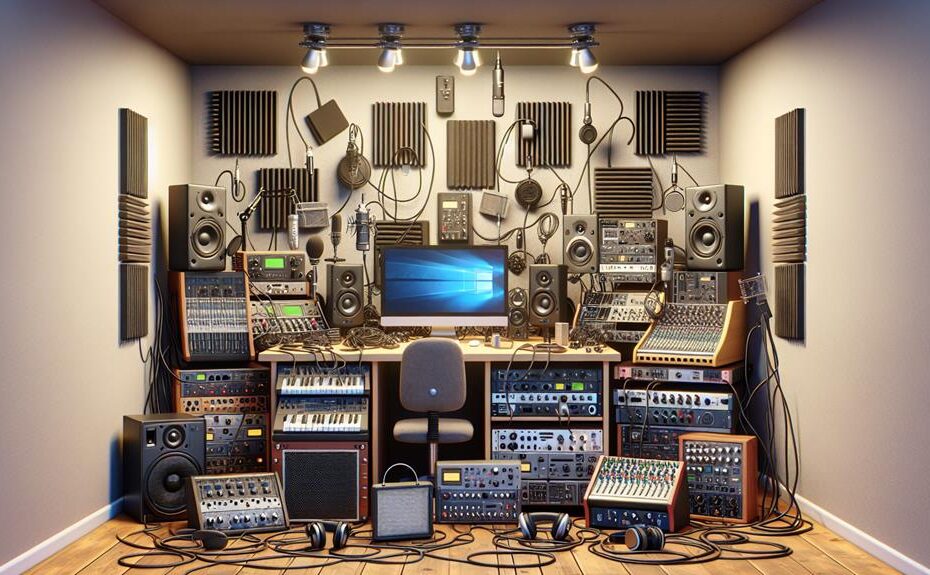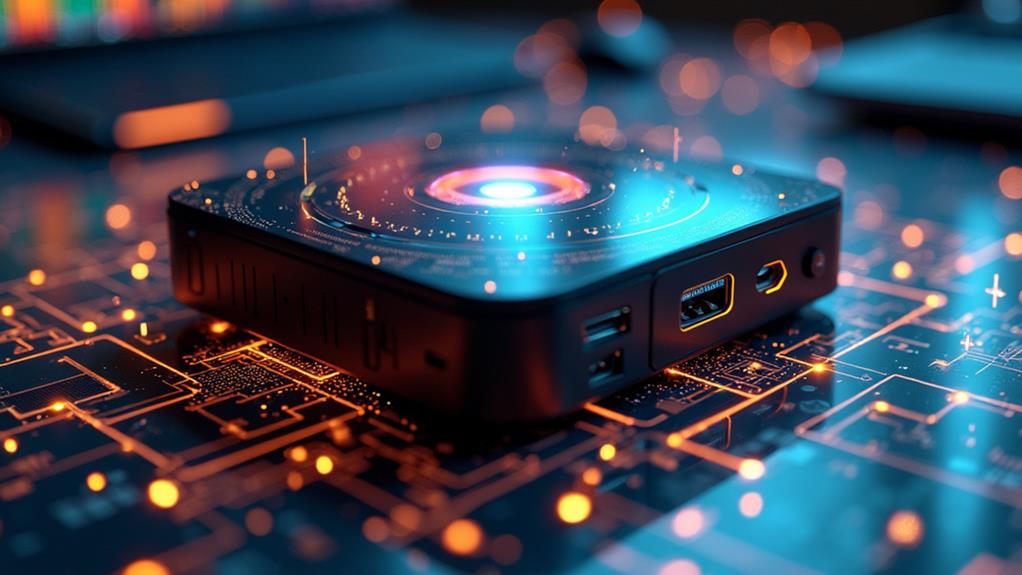



If you're looking to upgrade your audio production setup, have you ever considered using a mini PC for your professional audio production? Despite their small size, these compact systems offer impressive performance, handling demanding software requirements with ease. They can efficiently manage numerous virtual instruments and plugins while maintaining snappy response times. The portability and connectivity options they provide enable convenient integration into your existing workflow. With their quiet operation and efficient cooling, mini PCs make for an increasingly compelling solution for audio professionals. But how do you determine if they're the right choice for your specific production needs?
Key Takeaways
- Seamless Audio Production: Powerful mini PCs with high-performance processors, ample RAM, and fast storage ensure smooth multitasking and low latency.
- Balanced Compactness: Mini PCs offer a balance between processing power and compactness, ideal for professional audio production.
- Processor Options: Intel Core i7/i9 and AMD Ryzen processors provide high performance for demanding music production tasks.
- Connectivity and Interfaces: High-speed USB ports, Ethernet, Wi-Fi, HDMI, and DisplayPort enable seamless integration with professional audio interfaces and peripherals.
- Efficient Cooling: Innovative cooling systems and noise-reducing fans prioritize low noise levels, maintaining focus during prolonged audio production sessions.
Assessing Performance Needs
To achieve seamless audio production, consider opting for high-performance mini PCs that house advanced processors, a generous amount of RAM, and fast storage options to meet the demanding requirements of music production software and plugins.
Selecting the right mini PC for professional audio production involves careful consideration of several key factors. High-performance processors such as Intel Core i7 or i9 ensure smooth multitasking, low latency, and efficient audio processing. Necessary RAM capacity, typically at least 16GB, is vital for running multiple audio applications simultaneously. Solid-state drives (SSDs) with fast transfer speeds provide quick access to files, reducing latency in music production workflows.
When choosing a mini PC for audio production, compact form factor should not be the sole deciding factor. Opt for devices that balance power and compactness. With careful planning, high-performance mini PCs can deliver exceptional processing power, making them a dependable and efficient choice for professional audio production.
Choosing the Right Mini PC
When selecting a mini PC for professional audio production, look for devices that strike a balance between processing power and compactness, ensuring seamless integration with your audio setup and efficient workflow. High-performance processors like Intel Core i7/i9 or AMD Ryzen are essential for handling demanding audio production tasks without lagging. Adequate RAM, preferably 16GB or higher, and fast solid-state storage (SSD) are also vital for smooth performance, reducing the risk of audio dropouts and latency issues.
In addition to processing power, consider the connectivity options. Multiple USB ports, Thunderbolt, and HDMI connections enable easy integration with audio interfaces, MIDI controllers, and external displays, ensuring your equipment seamlessly communicates with the mini PC. Moreover, efficient cooling mechanisms are indispensable for maintaining ideal operating temperatures in professional studio environments where noise levels must be minimized. With these factors in mind, mini PCs offer a powerful, compact, and efficient solution for professional music production.
Mini PC Types and Options
Mini PCs come in a variety of configurations, each catering to specific needs and preferences, thereby allowing professionals to select the most suitable device for their audio production demands. For macOS enthusiasts, the Apple Mac Mini offers impressive processing power withainter % its M1 chip, delivering seamless integration with Logic Pro and other popular digital audio workstations (DAWs).
Intel's NUC 11 Performance Kit is an excellent choice for demanding music production tasks, powered by an Intel Core i7 processor. For those seeking more affordable entry points, options like the GEEKOM AS 5 offer VESA mount compatibility and multiple USB ports, all at a lower cost. The GEEKOM Mini IT lineup is designed to meet the specific needs of music production, with powerful processors, ample storage and memory options, and a compact design for efficient studio operations.
Connectivity and Audio Interfaces
In professional audio production, your mini PC's choice of connectivity options plays a pivotal role in integrating audio interfaces and peripherals for ideal sound quality and versatility.
- High-Speed USB Ports: Multiple USB ports, including USB-C and Thunderbolt, guarantee smooth connections with professional audio interfaces and peripherals.
- Ethernet and Wi-Fi: Reliable Ethernet ports and Wi-Fi capabilities enable low-latency network connectivity for cloud-based collaboration and online music sharing.
- External Audio Integration: HDMI and DisplayPort outputs allow for seamless integration with external monitors for visual feedback and music production software.
- Wireless Peripherals: Bluetooth and Wi-Fi enable wireless connectivity with MIDI controllers, mobile devices, and other music production peripherals.
Managing Thermal and Noise Issues
As you prepare your mini PC for professional audio production, selecting components and design solutions that prioritize low noise levels and efficient cooling becomes imperative for maintaining focus during prolonged sessions. Noise can significantly impact your creative flow, making quiet operation a top consideration in your mini PC setup.
PCs with efficient cooling are essential for handling intensive tasks like audio processing, which require steady performance without performance throttling. For seamless multitasking, it is vital to manage power consumption effectively, as high energy use generates more heat. By focusing on desktop PCs that incorporate innovative cooling systems, you can ensure that your mini PC operates with minimal heat generation, maintaining optimal performance without compromise.
To achieve this, manufacturers often employ expert thermal management strategies, such as design-driven airflow and noise-reducing fans. By opting for mini PCs with these features, you can keep performance high and noise levels down, ensuring that your audio production sessions remain distraction-free.
Optimizing Software and Workflow
To guarantee peak performance and workflow efficiency, start by reviewing your digital audio workstation (DAW) to identify areas where resource usage can be maximized, thereby streamlining your music production process. There are several strategies you can employ to achieve ideal performance:
- Freeze tracks to reduce resource consumption and prevent audio dropouts in your DAW.
- Optimize plugins by selecting native plugins for your host operating system to improve efficiency.
- Streamline your workflow by bouncing effects to audio tracks and using GPU-accelerated audio processing whenever possible.
- Regularly upgrade hardware by adding more RAM or switching to faster SSDs to accommodate growing project complexity.
These techniques guarantee that your mini PC, with its optimized software, handles resource-intensive tasks such as recording and managing large audio projects. This effectively addresses the limitations generally associated with using mini PCs for professional audio production. By adopting these practices, you can efficiently manage tasks involving virtual instruments and other resource-demanding activities, making mini PCs a reliable alternative to traditional desktops and laptops.
Frequently Asked Questions
Are Mini PC Good for Developers?
As a developer, a mini PC offers various advantages: it's budget-friendly, compact, and portable, with decent processing power.
What Kind of PC Is Needed for Music Production?
To produce high-quality audio, you'll need a PC that can handle demanding tasks efficiently. Think multi-core processor (in this case, a powerful mini PC is a great choice), vast RAM, and fast storage.
Are Gaming PCS Good for Audio Production?
You can consider gaming PCs for audio production, but guarantee the CPU has sufficient clock speed, multi-core performance, and storage capacity. Check audio interface and software plugin compatibility, and pay attention to cooling solutions, input/output ports, power supply quality, and graphics card capabilities.
How Much RAM Do You Need for Professional Music Production?
For professional music production, you'll need a minimum of 16GB RAM, ideally 32GB or more to handle large sample libraries, multiple tracks, and plugins, ensuring smooth multitasking performance and minimal noise and latency.
Conclusion
``` creampie vbCrLf
As you cedefulcrop into a career in professional audio production, rest assured that mini PCs can be your trusty sidekicks. By aligning your processing needs with their powerful processors, replete RAM, and lightning-fast storage, you'll be scoring Grammy-worthy hits in no time. These quiet workhorses will make sure your studio stays the zone, no noise pollution included.
Disclosure: As an Amazon Associate, I earn from qualifying purchases.





